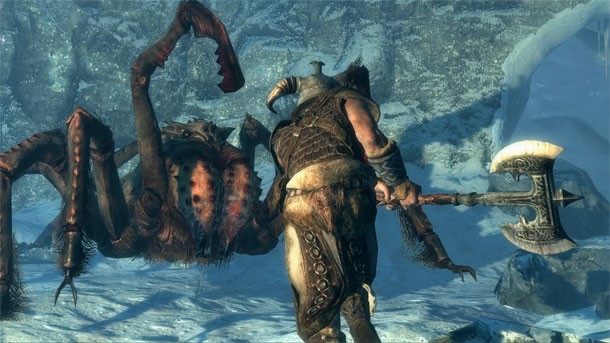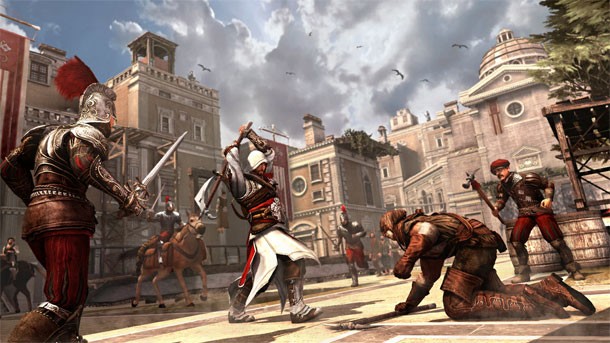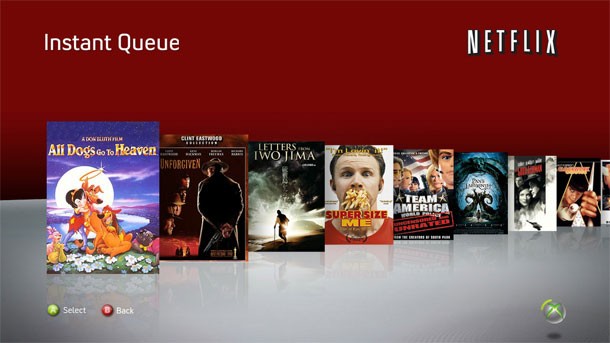Subscribe today to receive the next issue of Game Informer, featuring the Most Anticipated Games of 2026!
This Generation's Dominant Ideas

Most gamers associate better graphics and new IP with the launch of next-gen hardware, but there's a lot more that our current consoles brought to the table. Join us for a look at some of the ideas that have been introduced and/or cemented over the past few years of gaming, and what they could mean for next-gen consoles.

Gaming Moves Online:
While previous console generations gave us the ability to
take our games online, this round of hardware made online multiplayer
the default method for playing games with our friends. Splitscreen multiplayer
modes have become a luxury, and virtually every title now has an online
multiplayer component (for better or for worse). Some games like MAG and
Battlefield 1943 even forgo a single-player experience and instead offer only
online multiplayer. Voice chat also became a default standard this generation,
with very few games withholding the option to talk with your friends.
What it means for next-gen: Online gaming will only grow more prevalent with the next generation of consoles. Expect to see larger player counts in online matches, and more support for MMOs on home systems. You'll probably also see more alternatives to traditional online gaming, such as asynchronous multiplayer modes, and the further blending of single-player and multiplayer campaigns.

Cooperation is Key:
Not all players want to spend their time shooting their friends.
Co-op play has become another common bullet point on the back of current-gen
game boxes. Sometimes it's a dedicated mode, such as Call of Duty's Spec-Ops
missions or Gears of War's Horde mode. Other times, the story campaign can be
played with multiple players. Co-op support usually accommodates two to four
players, and great strides have been made to make it easy for friends to team
up together while still making progress in their own games.
What it means for next-gen: Just as with online multiplayer, co-op gaming is a popular feature developers would be crazy to abandon for next-gen consoles. We're guessing we'll see some new IP designed specifically for co-op gaming, as opposed to shoehorning co-op into existing franchises, as we've often seen in this generation.

A Downloadable Future:
Another result of this generation's online advancements,
downloadable games and DLC expansions have skyrocketed in popularity over the
past few years. With retail games becoming ever more expensive propositions for
developers, many have turned to DLC to make extra money on games after release.
Additionally, big-name studios and indie developers alike have embraced
downloadable games, with some titles like Limbo, Bastion, and Journey receiving
the same critical acclaim as triple-A offerings.
What it means for next-gen: Downloadable content has been a massive success for many developers, so expect next-gen consoles to accommodate more digital content. Larger hard drives, faster download speeds, and (hopefully) easier-to-use marketplaces will all make downloadable content even more available next generation.

Patches and Updates:
Like their PC gaming brethren, console gamers have finally
gotten accustomed to post-release technical support this generation. Whereas
Microsoft was once adamant that Xbox Live would not be used by developers to
fix bugs, it has since removed this restriction. Day one patches are no longer
uncommon, and some games such as The Elder Scrolls V: Skyrim have required a notorious
number of updates to iron out the kinks. Not all patches are negative, however.
The XBLA version of Minecraft has been patching in new content and
functionality since its release, and both Xbox 360 and PS3 have had new
features patched in via system updates over the years.
What it means for next-gen: Players may hate having to download and install game patches, but don't expect the situation to improve with the next system of hardware. If anything, next-gen games will be even larger and more ambitious, which in turn will make them harder to thoroughly play test. First-gen games will likely be even more susceptible to needing patches, as developers learn (and struggle with) the ins and outs of new hardware.

Another Year, Another
Sequel:
Another emerging trend that gamers are quick to complain
about is the annual sequel. While sports series have offered gamers annual
sequels for a long time, other franchises such as Call of Duty and Assassin's
Creed now put out new games on a yearly basis as well. A similar strategy
pretty much killed the rhythm genre, but that doesn't seem to have scared any
of the main publishers away from the tactic.
What it means for next-gen: It's too early to speculate on what next-gen game development will entail (or how long it will take), but as long it's economically viable, Activision, Ubisoft, and EA will continue doing it. We'd be surprised if those companies aren't planning to have installments of their biggest series ready for next-gen consoles, but they'll likely be eager to publish new IP as well, so gamers may see a break from annual sequels when the next round of hardware comes along.

A New Era For Gaming
On The Go:
As much as this generation of home consoles has influenced
gaming, the biggest change of the past few years came with the introduction of
the smartphone. Mobile and tablet gaming have introduced our favorite hobby to
millions of new consumers, facilitated the rise of countless indie game
developers, and given birth to new genres, play styles, and revenue models.
They've also dealt a massive blow to handheld gaming.
What it means for next-gen: We're already seeing crossover between console games and mobile games and apps, and we're guessing those connections will only grow with next-gen consoles. In addition to mobile games that affect your progress in their console counterparts (such as Mass Effect: Infiltrator), expect to see more console versions of mobile titles (such as the recently announced Angry Birds), as games on smartphones and tablets continue to evolve.

The Sprawl of RPGs:
Role-playing games have been around since the 8-bit days,
but this generation it seems like every game features some kind of RPG-like
progression system. Whether you're leveling up and attaining new guns in Call
of Duty or improving your haymaker in Fight Night Champion, XP and unlock
systems have become the norm. Character customization is also a common feature nowadays,
making it easier to step into the role of your hero. More games are also
starting to feature procedurally generated loot systems, such as Borderlands
and Dead Island.
What it means for next-gen: RPG systems are a hit with players because they give games a greater sense of depth and personalization – so why would developers stop including them? Expect these systems to only deepen with future consoles, as games become more complex, and more developers experiment with procedurally generated content.

Remakes Galore:
Classic games have made a big comeback this generation. From
virtual arcade classics to HD remakes, developers have tapped the entire history
of video games for viable rereleases. A wealth of classic games has also been
ported to mobile and tablet markets, proving that a good game never dies.
What it means for next-gen: We expect that a new round of hardware will provide consumers with the opportunity to buy all their favorite old games yet again. If they're feeling generous, Sony, Microsoft, and Nintendo could carry over users' purchases from one console to the next – but we wouldn't hold our breath.

More than Just Games:
Console makers have been adamant that this generation of
consoles would become more than just game machines, and would instead be the hubs
for our entertainment centers. It sounded like marketing hype at the time, but
it turned out to be true. Thanks to support for streaming services like Netflix
and Amazon Instant Video, owners now use their consoles for watching movies and
television as much as they do playing games. Both Xbox 360 and PS3 provide options
for listening to music and viewing pictures as well (though how much use they
see is debatable), rounding out the media options. PlayStation 3 owners can
also surf the Internet and watch Blu-Ray videos on their system, while Microsoft
promises to add web-browsing functionality in a future update.
What it means for next-gen: Console manufacturers will need to give consumers plenty of reasons to buy expensive new hardware, and being able to use a new generation of systems for more than just playing games is a great incentive. Expect to see even more app integration featured in future consoles, as tablets continue to expand people's expectations for what electronic devices are capable of.

The Social Network:
The original Xbox introduced gamers to the concept of the
Friends list, but this generation took it one giant step further. Not only can
you easily play games with your buddies, you can exchange messages, video chat,
and watch Netflix movies together. Series like Pinball FX and Need For Speed seamlessly
incorporate leaderboards and user message functionality into gaming, which makes
competing with your friends all the more addictive. Some games also tie
directly in to your favorite social networks, much to the chagrin of everyone
on the receiving end of your automated gaming updates.
What it means for next-gen: Considering the fact that you can tweet and update your Facebook status on pretty much any device that's got a microchip in it, we're guessing social networks will become even more integrated with the next generation of consoles. Expect Sony to make a major attempt to catch up to Xbox Live's functionality (possibly with the incorporation of a new monthly subscription fee), and for Nintendo to fumble its implementation of the newly announced Miiverse.
What other dominant ideas were introduced this console generation? Share them in the comments below.









